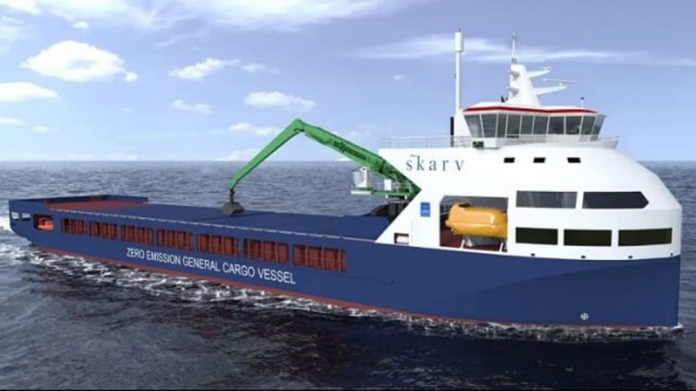
The Norwegian government is providing financing to support the development of a class of new short-sea vessels that will employ ammonia and other technologies to reduce emissions by at least 90 percent. The project has been identified as a way to demonstrate the path for short-haul shipping to adopt a wide range of zero-emission solutions.
The funding is being awarded by Enova, a state enterprise owned by the Norwegian Ministry of Climate and Environment. Started in 2001 to promote a shift towards more environmentally friendly energy consumption and production, the transport sector was added to Enova’s areas of responsibility in 2015. Each year, Enova is investing approximately $275 million to support innovative projects, including several in the shipping sector.
Skarv Shipping Solutions, a joint venture between Norwegian short-sea operator the Peak Group and the environmental group Greig Edge, plans to develop three low-emission cargo ships for operation on the Norwegian coast. They are receiving approximately $12 million from Enova for the project. Each vessel will have a cargo capacity of 4,000 tonnes and they will operate between the northern ports in Norway and the Oslo Fjord.
“With Enova’s decision, we are eager to move forward and accomplish our next goals,” said Jan Øivind Svardal, CEO of Skarv Shipping Solutions. He said the company is seeking “firm commercial agreements with our clients and initiating the contracting and construction of ships.”
The design calls for employing a range of innovative technologies. Propulsion will primarily be from an ammonia-fueled engine. Skarv says it will consider different technologies, including rotor sails, which, together with the hybrid electric system and a new hull design, will drastically reduce energy use. The vessels will also have electrical equipment for cargo handling.
They anticipate that the vessels will use an ammonia engine developed by Wärtsilä. They highlight that the engine manufacturer has previously tested the engine technology at the Sustainable Energy Catapult Center in Stord, and aims to deliver it towards the end of 2024. The decision to employ ammonia is based on the consideration that together with hydrogen, it is considered to be an important alternative in cases where batteries cannot ensure a good enough range.
The company reports that the grant will permit them to speed up the process in its zero-emission roadmap. Skarv was founded in 2022 to focus on the advancement of new technologies for coastal shipping.
Source – THE MARITIME EXECUTIVE




